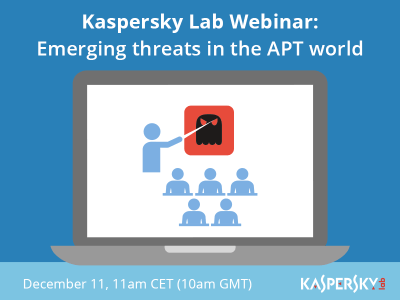
From Ransomware to Anonymous Browsing: Ten 2014 Tech Trends
Kaspersky Lab experts analyze the security and privacy trends that emerged in 2014, including anonymous Tor browsing, ransomware, APT attacks and more.
122 articles

Kaspersky Lab experts analyze the security and privacy trends that emerged in 2014, including anonymous Tor browsing, ransomware, APT attacks and more.

Costin Raiu, director of Kaspersky Lab’s Global Research and Analysis Team (GReAT) will be sharing his expert team’s predictions for 2015 during a special webinar on December 11. The predictions

In this Talk Security podcast, Threatpost’s Chris Brook and Brian Donohue discuss the move to encrypt the Web, the Regin APT campaign and more.

A new APT campaign called Regin targets the usual victims plus a prestigious cryptographer and the GSM standard on which most cellular communications occur.

In this episode of the Talk Security podcast, Threatpost’s Chris Brook and Brian Donohue discuss the Dark Hotel cyberespionage campaign and the WireLurker Apple malware.

Kaspersky Lab revealed a cyberspy campaign, Darkhotel, which had been active for seven years in a number of luxury Asian hotels.

APT is a term often mentioned in cybersecurity bulletins. Here’s what you need to know to understand it.

Brian Donohue and Chris Brook recap the month’s security headlines from its beginnings at Black Hat and DEFCON, to a bizarre PlayStation Network outage.

Community Health Systems breach exposes the Social Security numbers of 4.5 million patients. Were you a victim? If so, how do you react?

In the news this week: more APT campaigns, a look forward at the DEF CON and Black Hat Hacker conferences, and good and bad news for Facebook.

In the news: Microsoft’s No-IP takedown fiasco, Chinese APT groups curious about U.S. Iraq policy, Verizon says the government wants locations data, and Microsoft denies backdoor insinuations.

Microsoft moves against a malware-supporting webhosting company, NoIP, causing collateral damage in the process. The Miniduke APT campaign returns.

Miniduke APT campaign is reactivated. The malware received a number of updates, and a large part of it is apparently intended to throw off researchers. Not exactly a successful endeavor.

Whenever one hears the words ‘cyber espionage’, large-scale campaigns affecting entire national states and transnational corporations such as Aurora, Flame or Duqu come to mind. Unfortunately, cyber espionage doesn’t necessarily

This week we talked with Costin Raiu, Director of Kaspersky Lab’s Global Research and Analysis Team, on the topic of Advanced Persistent Threats and how they may impact businesses. The

Nowadays, we talk a lot about malware that invades our daily activities. Some are more dangerous than others — whether they target private users or companies. Organizations are also threatened